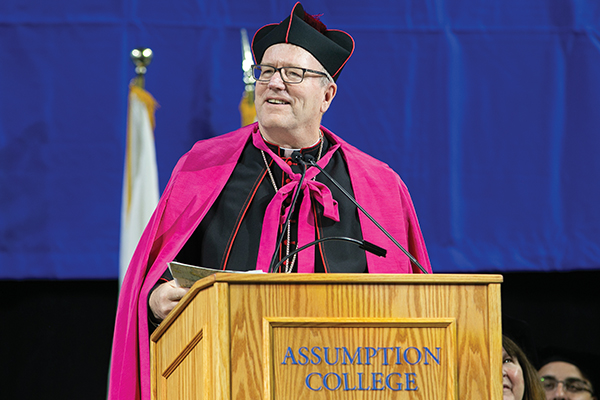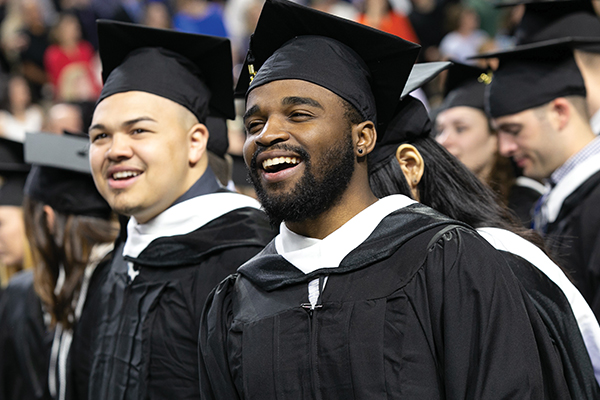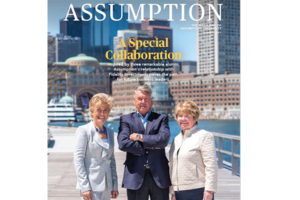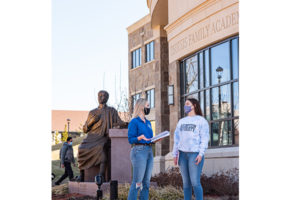
of 2018 to find happiness in God.
“God is love,” The Most Reverend Robert E. Barron, S.T.D., auxiliary bishop of the Archdiocese of Los Angeles, shared with Assumption’s 617 graduates. “Love is not a feeling or sentiment or act of the will. It is the desire of good for the other. Wanting what is best for someone else and then doing something about it. To love is to give oneself away.”
On Sunday, May 13, Bishop Barron proved why he is one of the world’s most well-known Catholic figures as he shared his wisdom with the Assumption Class of 2018 during the institution’s 101st Commencement ceremony held at the DCU Center in downtown Worcester. Bishop Barron, an evangelist who uses various forms of modern media, in particular, social media, to share the Gospel message, and one of the most-followed Catholics on social media, told graduates that the key to happiness and the cure for a restless heart was in God.
“We human beings can experience all the good the world has to offer – wealth, pleasure, honor, and power – and still feel unsatisfied and restless,” he said. “It’s because we were made for more than that. …The satisfaction of the restless heart is in God.”
Because of his considerable social media following (1.5 million on Facebook and nearly 150,000 on You-Tube), Bishop Barron is well known beyond the halls of academia and the Archdiocese of Los Angeles. “When I had a chance to interview His Excellency …he expressed concern that some people have stopped going to church, making it necessary for the Church to do more to reach out to them in new ways,” said Noor Kawmi ’18, this year’s salutatorian, in her introduction of the 2018 Commencement speaker.
In addition to delivering the Commencement address, Bishop Barron received an honorary Doctor of Humane Letters. Honorary degrees were also conferred upon Judith S. Beck, Ph.D., president and co-founder of The Beck Institute for Cognitive Behavior Therapy, who received a Doctor of Humane Letters; and John Agresto, Ph.D., former president of St. John’s College in Santa Fe, NM, who received a Doctor of Humane Letters. The recipients were honored for their dedicated work to community service and living the Assumption mission.
 During the ceremony – in which 406 Bachelor of Arts degrees, 180 graduate studies degrees (Master of Arts and Master of Business Administration) and certificates, and 31 Continuing and Career Education degrees (Bachelor of Arts, Bachelor of Business Administration, Bachelor of Science, and associate’s degrees) were awarded – Francesco C. Cesareo, Ph.D., president of Assumption, urged graduates to continue to live the institution’s mission in their future endeavors.
During the ceremony – in which 406 Bachelor of Arts degrees, 180 graduate studies degrees (Master of Arts and Master of Business Administration) and certificates, and 31 Continuing and Career Education degrees (Bachelor of Arts, Bachelor of Business Administration, Bachelor of Science, and associate’s degrees) were awarded – Francesco C. Cesareo, Ph.D., president of Assumption, urged graduates to continue to live the institution’s mission in their future endeavors.
“The institution’s mission statement states that Assumption ‘strives to form graduates known for critical intelligence, thoughtful citizenship, and compassionate service.’ These are qualities that will serve you well in both your personal and professional lives,” he explained. “In a time of competing world views, agenda-driven narratives, social media, and the lack of clarity as to what information is or is not true, critical intelligence will allow you to reason carefully, to recognize the complexities and paradoxes of the human condition, and to recognize that you should not accept everything you hear or read at face value, that there are different sides to consider in every situation, and that the goal is to arrive at the truth.”
Raysa Guerrero ’18, Class of 2018 valedictorian, encouraged her classmates to celebrate the moment, but also to look back in gratitude for what each of them has learned over the last four years, including the important lessons learned in the face of failure.
“I believe that failure is one of the best measures of character,” said Guerrero, who received a standing ovation after her speech. “Who you are has everything to do with how you react in the face of failure. In any given moment, you can allow failure to define you or you can use it to help you become the person you want to be. We need to examine our failures more than our successes because it is failure that molds us. Failure has been part of our academic experience, athletic undertakings, and co-curricular endeavors. I guarantee you that we learned more from the exam we failed than from the one we aced.”


